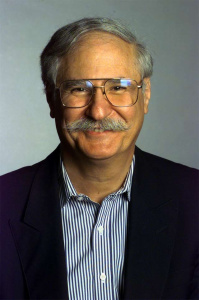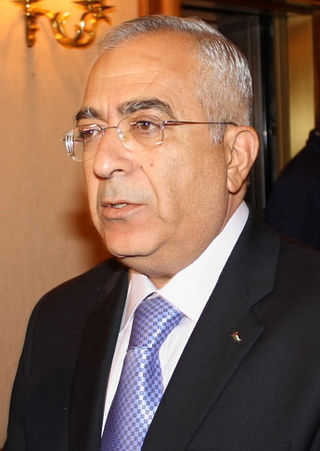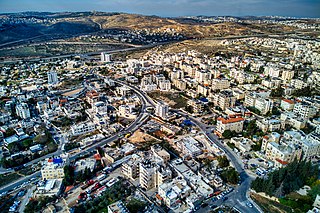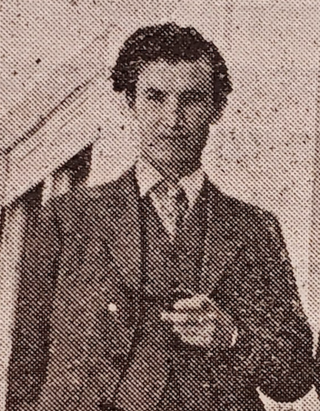The Palestine Center (previously called the Center for Policy Analysis on Palestine until 2002) is an independent educational program based in Foggy Bottom, Washington, D.C. Their focus is on the Israeli–Palestinian conflict and other Middle East issues.
It was set up in 1991 as an educational component of The Jerusalem Fund for Education and Community Development. The Fund is a 501(c)(3) non-profit grant-making organization operating in the United States. [1] Its founders include the late professors Hisham Sharabi of Georgetown University [2] and Samih Farsoun of American University. [3] Sharabi was a founder of the Center for Contemporary Arab Studies at Georgetown University. [4] The founding director of the Center was Muhammad Hallaj who held the post until 1994. [5] The current executive director is Zeina Azzam.
The center analyzes relations between the United States and the Middle East with a focus on the Palestinian issue. The center studies specific U.S. policies, publishes reports, briefing, and analysis, and serves as a venue for Palestinian and Arab scholars.
The center also houses the Hisham Sharabi Memorial Library, one of the largest Palestine-centered collections in the United States. [6] The center employs fellows to conduct policy research. It published extensive online audio archives of its events going back to the early 1990s, [7] a blog [8] and a YouTube page to document its on-site events.
The center has been referenced by diverse news media from the Turkish Weekly [9] to the Washington Times [10] and Christian Science Monitor . [11]
The Palestine Center publishes press releases as mentioned above, as well as articles written by fellows.
The Palestine Center holds weekly events and often invites distinguished speakers. Speakers at the Palestine Center have included former Israeli Knesset member Azmi Bishara, [12] Palestinian diplomat Afif Safieh, [13] Clovis Maksoud, [14] Ambassador Nabil Fahmy, Egyptian Ambassador to the United States, [15] Hanan Ashrawi, [16] Palestinian Prime Minister Salam Fayyad, [17] and John Mearsheimer, [18] among others.
{{cite web}}: CS1 maint: archived copy as title (link)
The Palestinian National Authority, commonly known as the Palestinian Authority and officially the State of Palestine, is the Fatah-controlled government body that exercises partial civil control over West Bank areas "A" and "B" as a consequence of the 1993–1995 Oslo Accords. The Palestinian Authority controlled the Gaza Strip prior to the Palestinian elections of 2006 and the subsequent Gaza conflict between the Fatah and Hamas parties, when it lost control to Hamas; the PA continues to claim the Gaza Strip, although Hamas exercises de facto control. Since January 2013, the Palestinian Authority has used the name "State of Palestine" on official documents, although the United Nations continues to recognize the Palestinian Liberation Organization (PLO) as the "representative of the Palestinian people".
This timeline of the Israeli–Palestinian conflict lists events from 1948 to the present. The Israeli–Palestinian conflict emerged from intercommunal conflict in Mandatory Palestine between Palestinian Jews and Arabs, often described as the background to the Israeli–Palestinian conflict. The conflict in its modern phase evolved since the declaration of the State of Israel on May 14, 1948 and consequent intervention of Arab armies on behalf of the Palestinian Arabs.

Samih K. Farsoun was a professor emeritus of sociology at American University, where he taught for thirty years until his retirement in 2003.

Salam Fayyad is a Jordanian-Palestinian politician who served as the prime minister of the Palestinian Authority and the finance minister.
Arab Studies Quarterly (ASQ) is an English-language academic journal devoted to Arabist studies. It was established in 1979 by the Professors Edward Said and Ibrahim Abu-Lughod. They envisioned the journal to be a platform for academic research to counter anti-Arab propaganda veiled by academic jargon. Since its inception, ASQ has been a refereed academic journal that publishes articles on the Arabs, their history and social and political institutions.
Mohammed Shabir was a Palestinian politician and academic who served as president of the Islamic University of Gaza from 1990 to 2005. He was the Prime Minister-in-waiting for the National Unity Government 2007. Senior Hamas officials announced that Hamas and Fatah had agreed on him on 13 November 2006. Shabir, however, did not become Prime Minister. Salam Fayyad became Prime Minister when Hamas took over Gaza, in 2007. Considered close to both Hamas and Fatah, Shabir frequently visited the late Yasser Arafat in his West Bank and Gaza Strip headquarters.
The American Task Force on Palestine(ATFP) is an organization founded in 2003 to advocate that it is in the American national interest to promote an end to the Palestinian–Israeli conflict through the creation of a Palestinian state alongside Israel.

Beit Hanina is an Arab Palestinian neighborhood in East Jerusalem. It is on the road to Ramallah, eight kilometers north of central Jerusalem, at an elevation of 780 meters above sea level. Beit Hanina is bordered by Pisgat Ze'ev and Hizma to the east, Ramot, Ramat Shlomo and Shuafat to the south, Beit Iksa and Nabi Samwil to the west, and Bir Nabala, al-Jib, Kafr Aqab and ar-Ram to the north.

Walid Khalidi is a Palestinian historian who has written extensively on the Palestinian exodus. He is a co-founder of the Institute for Palestine Studies, established in Beirut in December 1963 as an independent research and publishing center focusing on the Palestine problem and the Arab–Israeli conflict, and was its general secretary until 2016.

Palestinian art is a term used to refer to paintings, posters, installation art and other visual media produced by Palestinian artists.

Naseer H. Aruri was an American scholar-activist and expert on Middle East politics, U.S. foreign policy in the Middle East and human rights. Aruri was Chancellor Professor (Emeritus) of Political Science, having served on the faculty of the University of Massachusetts-Dartmouth from 1965-1998. In 1993, he was the recipient of the College of Arts and Sciences “Distinguished Research Award”. Aruri’s papers have been preserved and are on display at the Claire T. Carney Library Archives and Special Collections at UMASS-Dartmouth.
Nur ad-Din Masalha commonly known in English as Nur Masalha is a Palestinian writer, historian, and academic.
The Center for Contemporary Arab Studies at Georgetown University in Washington, D.C., United States is an academic center "distinguished by its emphasis on study of the contemporary Arab world and its rigorous Arabic language training." Part of the Edmund A. Walsh School of Foreign Service, CCAS was founded in 1975; scholars Hanna Batatu and Hisham Sharabi were part of its founding.
Hisham Sharabi was Professor Emeritus of History and Umar al-Mukhtar Chair of Arab Culture at Georgetown University, where he was a specialist in European intellectual history and social thought. He died of cancer at the American University of Beirut hospital on January 13, 2005.
Tarif Khalidi is a Palestinian historian who now holds the Shaykh Zayid Chair in Islamic and Arabic Studies at the American University of Beirut in Lebanon.
Events in the year 2008 in the Palestinian territories.
Salim Tamari, is a Palestinian sociologist who is the director of the Institute of Palestine Studies and an adjunct professor at the Center for Contemporary Arab Studies at Georgetown University. Rashid Khalidi, the Edward Said Professor of Modern Arab Studies at Columbia University, has called Tamari "the preeminent Palestinian historical sociologist."
The Palestinian Centre for the Study of Nonviolence (PCSN) was founded in 1983 by Mubarak Awad, a Palestinian-American psychologist, and an advocate of nonviolent resistance.

The Palestinian governments of 2013 were two Palestinian governments established respectively in June and September 2013. They ruled de facto over the West Bank only.